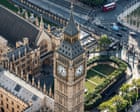Instead of recognising that social media harms mental health and democracy, the former deputy PM and Meta executive repeats company talking points
Nick Clegg chooses difficult jobs. He was the UK’s deputy prime minister from 2010 to 2015, a position from which he was surely pulled in multiple directions as he attempted to bridge the divide between David Cameron’s Conservatives and his own Liberal Democrats. A few years later he chose another challenging role, serving as Meta’s vice-president and then president of global affairs from 2018 until January 2025, where he was responsible for bridging the very different worlds of Silicon Valley and Washington DC (as well as other governments). How to Save the Internet is Clegg’s report on how he handled that Herculean task, along with his ideas for how to make the relationships between tech companies and regulators more cooperative and effective in the future.
The main threat that Clegg addresses in the book is not one caused by the internet; it is the threat to the internet from those who would regulate it. As he puts it: “The real purpose of this book is not to defend myself or Meta or big tech. It is to raise the alarm about what I believe are the truly profound stakes for the future of the internet and for who gets to benefit from these revolutionary new technologies.”



















